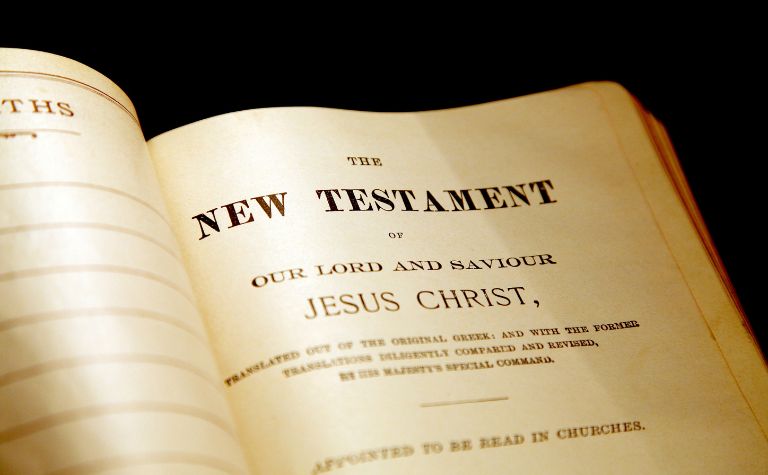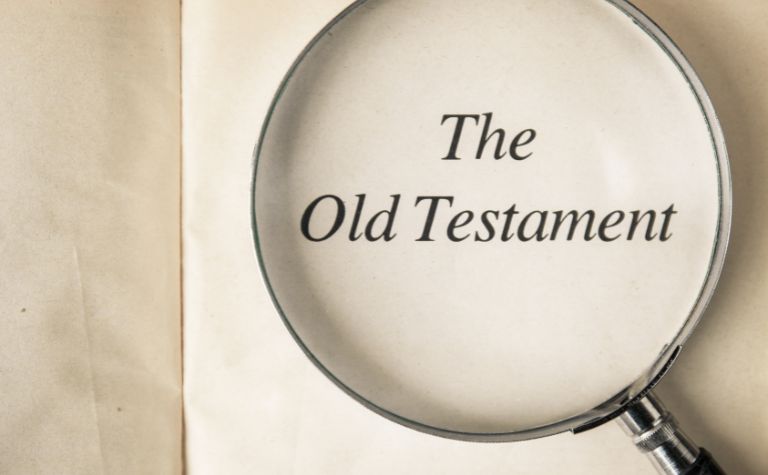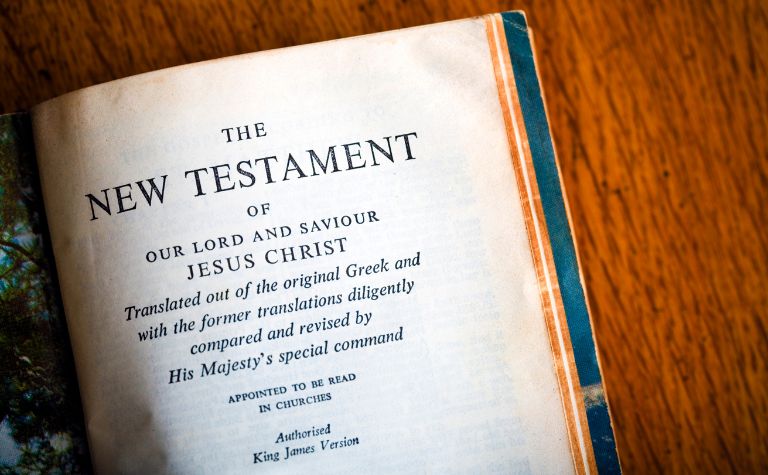The Bible is the best-selling and most-read book in history. From its first book, Genesis, to its last, Revelation, Scripture tells one unfolding story about God’s plan to redeem his creation from sin. The Bible has two parts, the Old and New Testaments, and many people want to understand their differences.
The Old Testament is the story of God working in Israel to save all people from sin through the Messiah. The New Testament is the story of the Messiah, Jesus of Nazareth, from his birth, sinless life, sacrificial death, and resurrection to the community he created called the Church.
How do the total number of chapters, verses, and words of each testament compare? How does the organization of books differ between the testaments? What does the Old Testament say about Jesus Christ? How are Old and New Testament teachings about God similar? Keep reading to learn the answers to these questions and others.
Also, see Are There 46 Books in the Old Testament? to learn more.

Old Testament vs. New Testament: Size
Most Bibles are between 1,200 and 1,800 pages long. The more explanatory notes and application suggestions a Bible has, the longest it is. The size of the book, font, and whether the text appears in a one or two-column format also impact a Bible’s size.
| Old Testament | New Testament |
|---|---|
| “Old” refers to God’s covenant through Moses | “New” refers to God’s covenant through Jesus |
| 39 total books | 27 total books |
| Has 929 total chapters | Has 260 total chapters |
| It has 23,145 total verses | It has 7,957 total verses |
| Longest book by chapter: Psalms (150) | Longest book by chapter: Matt. and Acts (28) |
Regarding the size of the Bible’s content, as the tables below show, the Old Testament is significantly larger than the New. If a person read through the entire Bible, they would read about two to two-and-a-half chapters of the Old Testament to every chapter of the New.
| Old Testament | New Testament |
|---|---|
| Longest book by verses: Psalms (2,526) | Longest book by verses: Luke (1,151) |
| Longest book by words: Psalms (42,704) | Longest book by words: Luke (25,640) |
| Shortest book by chapter: Obadiah (1) | Shortest book by chapter: 2-3 John, Phile., Jude (1) |
| Shortest book by verses: Obadiah (21) | Shortest book by verses: 2 John (13) |
| Shortest book by words: Obadiah (669) | Shortest book by words: 3 John (294) |
Old Testament vs. New Testament: Organization
The Old Testament is partly chronologically and partly arranged according to genre or writing style. Genesis through Esther is chronological. The books of poetry and prophets occur on the timeline between Genesis and Esther. For example, Job occurs during the time of Abraham (Gen. 12-25), and David wrote many of the Psalms during his lifetime (1-2 Samuel).
| Old Testament | New Testament |
|---|---|
| First 2/3 of the Bible | Last 1/3 of the Bible |
| Written in Hebrew | Written in Greek |
| Major authors: Moses, David, Solomon | Major authors: Luke, Paul, John |
| A few passages are in Aramaic (e.g., Dan. 2:4-7) | A few words are in Aramaic (e.g., Abba) |
| First five books: Moses’ writings (Gen.-Deut.) | First four books: Gospels (Matt.- John) |
The Old Testament has four sections: the writings of Moses (i.e., the Law), the Books of History, the Poetic or Wisdom Literature, and the Major and Minor Prophets. The New Testament has five sections: the Gospels, Acts, the Letters of Paul (Rom.-Phile.), the General Letters (Heb.-Jude), and Revelation.
| Old Testament | New Testament |
|---|---|
| Includes 12 history books (Josh.-Est.) | Includes one history book (Acts) |
| Includes five poetic books (Job-Song) | Doesn’t include poetic books |
| Includes 17 prophetic books (Isa.-Mal.) | Doesn’t include prophetic books |
| It doesn’t contain epistles or letters | Includes 21 epistles or letters |
| A few sections are apocalyptic literature (e.g. Dan. 7-12) | Revelation is all apocalyptic literature |
Also, see What Is the New Testament? to learn more.

Old Testament vs. New Testament: History
Many of the historical differences between the Testaments come from the fact that the Old occurs over a much more extended period of time than the New.
| Old Testament | New Testament |
|---|---|
| Occurs completely before Christ | Occurs entirely after Christ |
| Occurs over thousands of years | Occurs over 100 years |
| Tells the story of Israel (Gen. 12:1-3) | Extends the story to other nations (Acts 1:8) |
| Believers under multiple empires (e.g., Babylon) | Believers under one empire (e.g., Roman) |
| Believers in multiple settings (e.g., Egypt) | Believers in multiple settings: (e.g., Patmos) |
Even though the Old Testament tells the story of Israel, it constantly mentions the forthcoming Messiah. Likewise, even though the New Testament tells the story of the Messiah, it constantly mentions Israel.
Saint Augustine alluded to this when he famously said, “The new [testament] is in the old [testament] concealed; the old is in the new revealed.”
| Old Testament | New Testament |
|---|---|
| Israel in and out of the Promised Land | Israel in the Promised Land under Roman rule |
| First book written: Genesis (ca. 1445 B.C.) | First book written: James (ca. 44 A.D.) |
| Last book written: Nehemiah (ca. 424 B.C.) | Last book written: Revelation (ca. mid-90s A.D.) |
| Ends waiting for the Messiah’s arrival | Begins with the Messiah’s arrival |
| 400 years of silence after Malachi | John the Baptist breaks the silence |
Also, see What Is the Last Book of the Old Testament? to learn more.

Jesus in the Old and New Testaments
The Old Testament reveals a lot of information about Jesus in the form of prophecy. Therefore, it is important to New Testament writers to show how Jesus fulfilled Old Testament prophecy, so they often quote and allude to the Old Testament (e.g., Matt. 1:22).
Moreover, after Jesus rose from the dead, John writes, “These are my words that I spoke to you while I was still with you, that everything written about me in the Law of Moses and the Prophets and the Psalms must be fulfilled. Then he opened their minds to understand the Scriptures” (Luke 24:44-45, ESV).
| Old Testament | New Testament |
|---|---|
| The Old Testament foretells of Jesus | The New Testament tells of Jesus |
| Jesus existed as the Word (Gen. 1:1; John 1:1) | The Word became human (John 1:14) |
| God created all things (Gen. 1:1; Isa. 44:24) | Jesus created all things (John 1:3; Col. 1:16) |
| God identified himself as the “I am” (Exod. 3:14) | Jesus identified himself as the “I am” (John 8:58) |
| The Messiah would be born in Bethlehem (Mic. 5:2) | Jesus was born in Bethlehem (Matt. 2:4-6) |
| Old Testament | New Testament |
|---|---|
| The Messiah would be in the line of David (2 Sam. 7:16) | Jesus was in the line of David (Luke 1:32-33) |
| The Messiah would be born of a virgin (Isa. 7:14) | Jesus was born of a virgin (Matt. 1:18) |
| The Messiah would perform miracles (Isa. 29:18) | Jesus did miracles (Matt. 11:5 |
| The Messiah would be crucified (Psa. 22:1, 6-18) | Jesus was crucified (Matt. 27:33-50) |
| The Messiah would rise from the dead (Psa. 16:10) | Jesus rose from the dead (Acts 2:27) |
God in the Old and New Testaments
The Bible teaches God is unchanging. Though his plan to save the world from sin has different eras over a long period of time, God’s character and nature are fixed.
| Old Testament | New Testament |
|---|---|
| There is only one true God (Deut. 4:35) | There is only one true God (John 17:3) |
| God is one (Deut. 6:4) | God is one (Eph. 4:6) |
| God is three (Gen. 1:26, 3:22; Isa. 6:8) | God is three (Matt. 28:19; 2 Cor. 13:14) |
| God is eternal (Psa. 90:2) | God is eternal (1 Tim. 1:17) |
| God is unchanging (Psa. 102:27) | God is unchanging (James 1:17) |
| God is omnipresent (Psa. 139: 7-10) | God is omnipresent (Acts 17:27-28) |
| God is omnipotent (Psa. 147:5) | God is omnipotent (Mark 10:27) |
| Old Testament | New Testament |
|---|---|
| God is omniscient (Psa. 139:1-4) | God is omniscient (Heb. 4:13) |
| God is good (Psa. 100:5) | God is good (Matt. 5:45) |
| God is wise (Dan. 2:20-21) | God is wise (Rom. 16:27) |
| God is holy (Isa. 6:1-3) | God is holy (1 Pet. 1:15-16) |
| God is loving (Psa. 42:8) | God is loving (John 3:16) |
| God is gracious (Exod. 33:19) | God is gracious (Eph. 2:5-9) |
| God is faithful (Deut. 7:9) | God is faithful (1 Thess. 5:24) |
Also, see Who Wrote the New Testament? to learn more.
References:
[1] The Essential Scriptures by Kevin D Zuber
[2] The NIV Study Bible
Related Questions
The New Testament is the most significant collection of writings in world history. Each gospel, letter, historical account, and sermon describe the life and ministry of Jesus of Nazareth and the...
Regular Bible reading is a valuable habit, as Scripture is God's message to people. However, the Bible's 66 distinct books, featuring various authors, settings, and themes, can make it challenging...
